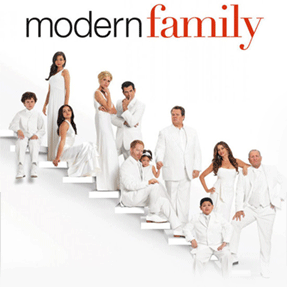Estate planning for modern families
| Summary: Estate planning is important in any family, whether it’s insurance to protect against health issues or death, or to provide financial protection in the event of a marriage breakdown. In the brave new world of modern estate planning, the experts all agree that setting the ground rules early is the best approach. |
| Key take-out: The law is fairly clear that anything earned or acquired during the course of a marriage is considered marital property and subject to division. |
| Key beneficiaries: General investors Category: Estate planning. |
If ABC’s Emmy-award winning TV show, Modern Family, can teach us anything about estate planning, it’s that the definition of a traditional nuclear family has been stretched considerably in the last quarter century.
The show spoofs nonconventional family dynamics that mirror the blended families – like second marriages, same-sex couples and adopted children — that are found throughout contemporary society. Wilmington Trust discussed with us some useful tips for families navigating this “brave new world” of modern estate planning.
Planning for “blended” families
Americans are increasingly cobbling together new families out of earlier broken marriages. According to the latest US Census Bureau statistics, at least one spouse was previously married in 30% of all American marriages.
(According to the Australian Bureau of Statistics, of the marriages registered in 2011, 29% had either the bride or groom (or both) recorded as previously married. In 1991, 32% of marriages registered in the year involved at least one party who was previously married).
Effective estate planning for these modern families, made up of past and present marriages, requires a fair amount of finesse and family engagement, to settle disagreements early on and to financially provide for both the current spouse and the children from a previous marriage.
Since the vast majority of wealth is held by the wealth-creating patriarch, says Roger Hobby, Northeast Region president of Wilmington Trust, estate planning discussions typically revolve around the patriarch’s world view.
Hobby recalls an initial estate planning meeting involving one such “blended” family, when the 80-year old patriarch was told that the family gathering would begin with an exercise to, literally, decide the temperature of the room. As soon as his family came in, the patriarch “goes over to the thermostat, saying ‘it’s cold in here’ and cranks it up to a temperature he was comfortable with.” Hobby quickly realised he was going to have his work cut out for him.
It’s generally a good idea if the patriarch can get comfortable ceding some control of the decision-making process to other family members. The patriarch’s plans to distribute wealth could fuel an in-house feud if family members aren’t properly consulted in advance about the plan’s essential fairness.
A simple question – such as, “Are spouses family?” – can yield some interesting results and heated debate in such blended families. A patriarch might say, “no,” while the matriarch or second wife often offers up an emphatic, “yes.” So families dividing up an estate must first identify who is sitting at the table for the discussions.
After those initial questions are answered, generational impediments come into play. It can be hard for an ageing father to see his daughter other than as the mother of his grandchildren – or his son other than the heir apparent of his business. But that conventional view often doesn’t apply in the modern age, when a well-educated daughter with children, can, at times, be more competent than the officially designated male heir. Biases perceived by the next generation may elude the father.
“It has nothing to do with discrimination, because they love their children universally,” Hobby says. But “our job is to point out, that, ‘you’re not being fair’.” His advice: start the conversation early before these biases overload the estate planning discussions.
Divorced women and their wealth
Studies put the marriage-divorce rate in America for first marriages at 41 to 50%; the rate for second marriages ranges from 60 to 67%, and for third marriages it’s a touch over 70%. (In Australia, around one in three marriages end in divorce).
That’s why it is critically important that women who are not the primary breadwinner of the family understand their true worth, regardless of the size of their pay cheque, says Carol Arnott Robbins, regional manager of M&T Securities.
“The reality is, marriage is an economic partnership,” says Arnott Robbins, similar to two partners who own a business. The law is fairly clear that anything earned or acquired during the course of a marriage is considered marital property and subject to division. Therefore, when that partnership dissolves, each has a claim on those assets, regardless of whose name is on the title.
The problem is many women defer financial planning to their spouses, Robbins explains, and can find themselves financially paralysed upon divorce. The advent of electronic filing has changed things for the better, but, still, some women view their tax returns for the first time only during a divorce.
Some questions Robbins has asked her women clients recently: “What happened to the $US100,000 distribution that came out of his 401k last year?” “Are you aware that he reported $US81,000 in gambling losses last year?” “Are you aware that your [joint] tax refunds are going to an individual account in his name only?”
The key, Robbins says, is access to information so that women are confident and financially prepared to move into the next phase of their lives.
Estate planning for same-sex couples
In June, the Supreme Court struck down California’s Defense of Marriage Act, which denied federal benefits to gay couples who are legally married. Equally importantly, the Internal Revenue Service recently decreed that same-sex couples must file federally as if they are married, even if the state in which they reside does not recognise their marriage. (There are currently 13 states that recognise same-sex marriages, including California, Connecticut and Massachusetts.)
The IRS ruling, in effect, forces states to recognise same-sex marriages for tax purposes, since state tax laws are set up to follow federal law.
The IRS position, says Wilmington’s Bruce Hoffmeister, will lead to a fair amount of ambiguity at the state level – when state treatment of same-sex marriages differs from the federal position – but it has already provided wealthy same-sex couples with unique options for transferring wealth to spouses and their children.
It starts with same-sex couples now being able to take advantage of the unlimited marital deduction, meaning they can leave unlimited amounts of property to their spouses without incurring the 40% estate tax. Previously, $US5.25 million, under the lifetime gift tax exemption, could be left to the surviving spouse tax-free.
Furthermore, same-sex couples can also use the marital-deduction trust known as a Qualified Terminable Interest Property or QTIP. This sort of a trust provides an income stream to the surviving spouse until their death, whereupon the remaining assets are transferred to other named beneficiaries. Another benefit of the IRS ruling relates to the portability of the couple’s combined estate tax exemption, allowing a couple to jointly transfer up to $US10.5 million in assets tax-free to the next generation.
Upshot: All families – in whatever form they take– need sound estate planning when serious wealth is at stake.
This article was first printed in Barron’s, and is reproduced with permission.
















